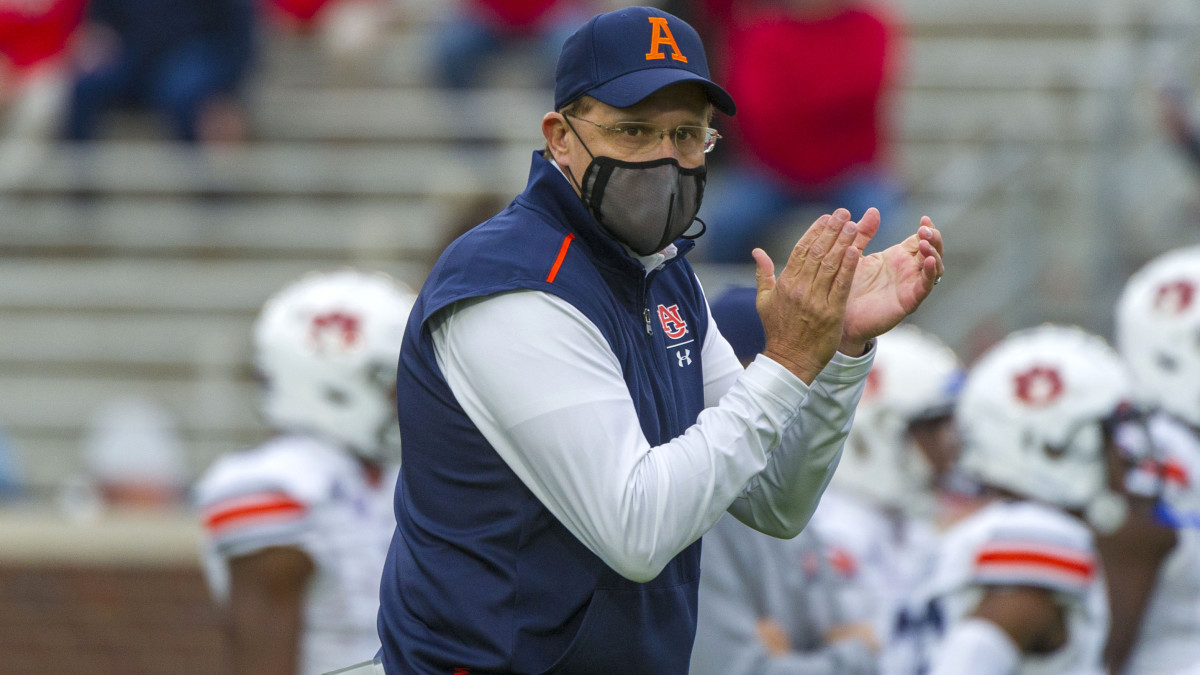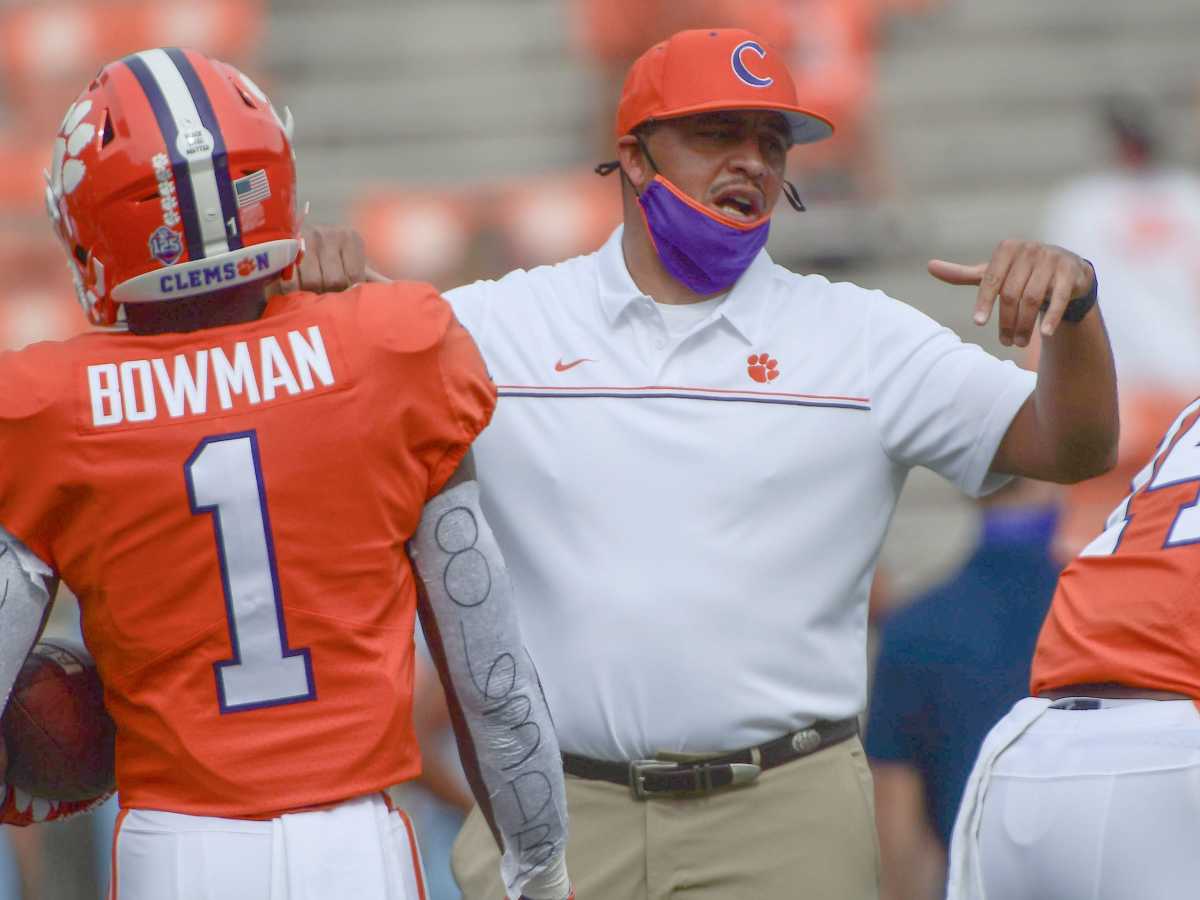Forde-Yard Dash: Auburn and Texas Display Different Approaches to the Coaching Carousel
Forty names, games, teams and minutiae making news in college football (laterals sold separately in Kalamazoo):
MORE DASH: Everything Florida Lost | Championship Week | Auburn's Comical Start
FIRST QUARTER: TEXAS AND AUBURN, A STUDY IN CONTRASTS
On Saturday, Texas (1) did what one would reasonably expect a school to do in the midst of a budget-draining pandemic. It avoided adding a $24 million expenditure to its athletic bottom line by retaining embattled coach Tom Herman. While his tenure has been underwhelming, Herman does have a winning record (a .632 overall winning percentage, .595 in the Big 12)—and if you can’t land Urban Meyer, give the man another chance to do better rather than spending a fortune on a new hire you can’t be sure about.
And then on Sunday, Auburn (2) did its thing. Its boosters lit cigars with hundred dollar bills and kicked Gus Malzahn to the curb. (Unfortunately, this operation didn’t involve a booster jetting off to set up a deal with the next coach behind the back of the current coach. That we know of.)

Auburn fired a coach with a better record in a tougher conference (.661 overall, .591 in the Southeastern Conference, with one SEC title and two SEC West titles) at similarly exorbitant expense. The total buyout figure for Gus Malzahn is $21.45 million, with more than $10 million of that payable within 30 days. It’s likely that Auburn then will have to turn around and spend millions more to buy out its next coach, and then additional millions on actually paying that new coach and its staff.
Because Malzahn, who never had a losing record at the school, had the temerity to go 6-4 in a 10-game SEC schedule. Four teams in the SEC have a better record than 6-4: Alabama (10-0), Texas A&M (7-1), Florida (8-2) and Georgia (7-2). Over Malzahn’s eight seasons, Auburn has the fourth-best record in the SEC, behind only Alabama, Georgia and LSU. The Tigers also join those three as the only teams to win the league title in the past eight seasons.
That’s pretty good. But not good enough at a school that has a case of TDS: Tide Derangement Syndrome.
In June, Auburn estimated that the pandemic had cost the university $27 million. (That number has assuredly grown since then.) As a result, the school said it was imposing “cost-saving measures” for the 2020-21 academic year that included an elimination of annual merit pay increases and deferring projects. But remember: tough times never touch the football program at places like Auburn.
Meanwhile, over on the athletic side of campus, they’ve stood behind basketball coach Bruce Pearl amid an NCAA investigation that has produced at least one Level One violation (the most severe) and self-imposed a postseason ban on the current team. And now they’ve raised millions of dollars to get rid of a winning football coach.
Given the mercenary nature of Auburn athletics, the natural fit as the next coach is Liberty’s Hugh Freeze (3). His record in two seasons at Liberty is 17-6, including 9-1 this year. His record against Nick Saban from his time at Mississippi is 2-3, a better winning percentage than Malzahn’s was at 3-5 (though that was the best of any current SEC coach against the boss of the SEC.) And if any school is going to be completely unbothered by skeletons in the closet, Auburn is it. Freeze has done nothing more scandalous at Liberty than coaching games from a hospital bed and a dental chair, so SEC commissioner Greg Sankey really has no veto power of any kind should Auburn choose to roll with Hugh.
If Freeze isn’t the guy, the hopper is full of candidates with Saban on their resume: Mario Cristobal of Oregon; current Crimson Tide offensive coordinator Steve Sarkisian; Billy Napier of Louisiana; and if Auburn wants to raid Mississippi again, current Rebels coach Lane Kiffin. The two most reliable connections when hiring in the SEC are CAA clients and men who worked under Saban.
BAD MONTH FOR BLACK COACHES
As for the other three non-Auburn openings at the Power 5 conference level, the schools all have one thing in common: they fired Black coaches. Derek Mason is out at Vanderbilt (4), Kevin Sumlin was fired Saturday at Arizona (5) and Lovie Smith Sunday at Illinois (6). While all of them were justifiable moves, it significantly lowers the percentage of minority coaches at the highest level of the sport. Currently there are just eight Black head coaches and 11 minorities out of 65 jobs.
All three of those jobs may well be filled by white men. Notre Dame defensive coordinator Clark Lea could be in the mix at both Vandy (his alma mater) and Illinois. So could Army coach Jeff Monken. Buffalo coach Lance Leipold will be on Illinois’s radar, as will former Wisconsin and Arkansas coach Bret Bielema. At Arizona, current San Jose State coach Brent Brennan checks a lot of boxes. They might all be good hires; they would not be diverse hires.
Black coaches organized in unprecedented ways during the summer to network and support one another, including a huge nationwide Zoom call network referred to by some as the “Underground Railroad.” Will there be any momentum from that? Will some of those coaches begin getting greater opportunities to move up the ladder? Or will college football remain stuck in a diversity time warp that leaves it far behind other industries and far outside of alignment with the racial makeup of the athletes?

Clemson offensive coordinator Tony Elliott (7) is more than ready to be a head coach, but also more than willing to stay in a good gig and be choosy about where he goes next. Cincinnati defensive coordinator Marcus Freeman (8) should get an opportunity soon. So should Florida offensive coordinator Brian Johnson (9), who interviewed with South Carolina (how seriously the school considered him is open to conjecture). If Brennan leaves San Jose, his defensive coordinator and associate head coach, Derrick Odum (10) could be a capable successor.
With Mason gone at Vanderbilt, the Southeastern Conference has no black head coaches. There are none in the Big 12. The Atlantic Coast Conference has one, Syracuse’s Dino Babers, and he will begin 2021 on the hot seat. The Big Ten has three (Maryland’s Mike Locksley, Michigan State’s Mel Tucker and Penn State’s James Franklin). The Pac-12 has four (Herm Edwards at Arizona State, Karl Dorrell at Colorado, David Shaw at Stanford and Jimmy Lake at Washington). As of now, more Power 5 schools have not had a full-time Black head coach (35) than those that have (30).
College football as a whole cannot point at individual schools and tell them it is their job to fix the coaching diversity problem in the sport. But there should be a collective will to do something about it.
MORE DASH: Everything Florida Lost | Championship Week | Auburn's Comical Start
